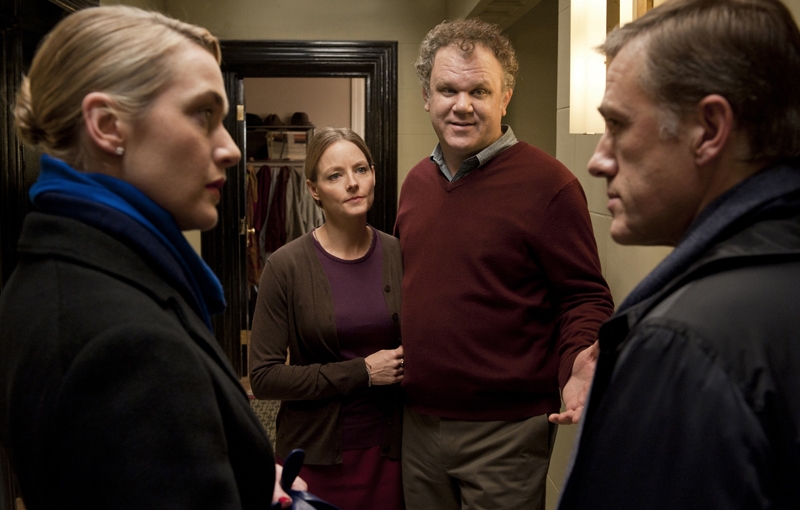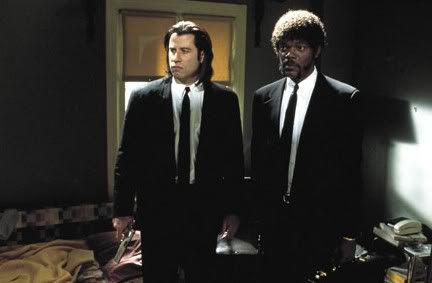The hills are alive with the sound of killing...
Taking direct inspiration for this review's opening statement from "The Godfather" in probably the same way those Indonesian death squad leaders did for their murderous deeds, Al Pacino's Michael Corleone character has once said in the sequel that if history has taught us anything, then it is that you can kill anyone. "The Act of Killing", a disturbing documentary film that, in equal measures, brutally condemns and trivializes genocide, shows us that, indeed, people can kill anyone they wish. But worst of all is that someone can kill thousands and still be revered as some kind of a savior. That happens, of course, if history books are written by the crazed victors, and that exactly what has occurred in the Republic of Indonesia sometime in the '60s.
Directed by Joshua Oppenheimer, Christine Cynn, plus an unknown native with the help of many other crew members that have chosen to stay anonymous (in fear of reprisal from the executors), the film is an oftentimes humorous but ultimately stomach-churning documentation of murderous mad men slowly going even madder and the despicable cinematic work that they attempt to make for kicks. You know, imagine Adolf Hitler or Pol Pot or even Kim Jong-un (well, I think the latter is really not that "left for the imagination") making genre films about their genocidal fits. "The Act of Killing", at least from how I see it, is an 'almost snuff film', as it reenacts, in accordance to the Indonesian executioners' romanticized memories of the killings, the way they whacked countless commie scums in numerous practical ways. These 'gangsters' ultimate goal is to remind Indonesian people about their brutal past. But do they really speak about the whole truth? Did history judge them right?
Joshua Oppenheimer and company, by distancing themselves and the camera as much as possible from the constant hullabaloo transpiring among the 'grotesque' human circus in their midst, are able to tell a gripping story of power, pride, and political madness that's both subjectively dramatic and convincingly journalistic. It also certainly helps that their subjects, Anwar Congo and Herman Koto, among others, are obnoxious 'characters' in their own rights, which further underlines the documentary's slow descent into insanity in a fashion that's even more animated than Al Pacino's scenery-chewing tendencies in "Scarface". To a jestful extent, I even imagine the two of them starring in a weekly reality show aptly entitled "The Killers", but I digress.
With the subjects' odd chemistry that, in a very morbid way, reminds me a lot of the one Jackie Chan, Yuen Biao, and Sammo Hung have shared in their prime, "The Act of Killing" successfully comes across as some sort of an energetic comedy film for all the wrong reasons, but its effect, once the misled humor fades well into the background, is painfully persistent. It's as unsettling a commentary on the darkness of man as Joseph Conrad's "Heart of Darkness", but this time, there seems to be little to no remorse at all. Here is a film that portrays insanity not as something brought about by psychological trauma (unlike Kurtz in the aforementioned novella) but as something molded and justified by extremist beliefs. "The Act of Killing" is so powerful and real and pitch black (the humor makes it all the more bleak) in its depiction of modern evil that I sometimes can't help but wonder if the whole thing is staged, and Anwar Congo and company are but hired actors. Well, I can only wish that it was all fake, the same way these thugs imagine that they're Hollywood actors merely portraying 'gangster' roles like Paul Muni and James Cagney.
There are films like "The Killing Fields" and "The Last King of Scotland", which are brave in their own rights by both recreating a violent point in an otherwise obscure country's history. But then, there are also works like Alain Resnais' short documentary "Night and Fog" and "The Act of Killing", which show, in all their tragic strands, the consequences of violence, inhumanity and extreme political will.
For the sake of everyone's peace of mind, I think it is a good thing that the film (or films?) Anwar Congo and company have made was not shown in its entirety in the documentary, except for Anwar's reaction while watching it, which seems to bode remorse. I think there's no sight worse than a bunch of murderers shamelessly feeding their huge, blood-drenched egos with a hagiographic film naturally made to make them look like superstars of their own ideology. But then again, as their vision of their fantasy film dwindles slowly into the absurd and the utterly surreal, so do their reputations as noble guardians of the state. A big-ass gangster playing a heavily made-up prostitute? An executioner, fresh from dying his hair black, being visited by the ghost of one of his victims in an outfit that's an amalgam of kimono sensibilities and Edward Scissorhands'? The joke's on them.
To look at things more lightly, I think what Joshua Oppenheimer has done to these people can be likened to what a mild-mannered student may possibly do, in retaliation, to the resident school bully. In that respect, "The Act of Killing", in an odd way, is a revenge film (at least from how I see it) that one ups these Indonesian harbingers of death without them even knowing it. I never thought that a film like this can be entirely possible. Now, can somebody make a film entitled "The Act of Torturing" about the Abu Ghraib prison?
FINAL RATING























